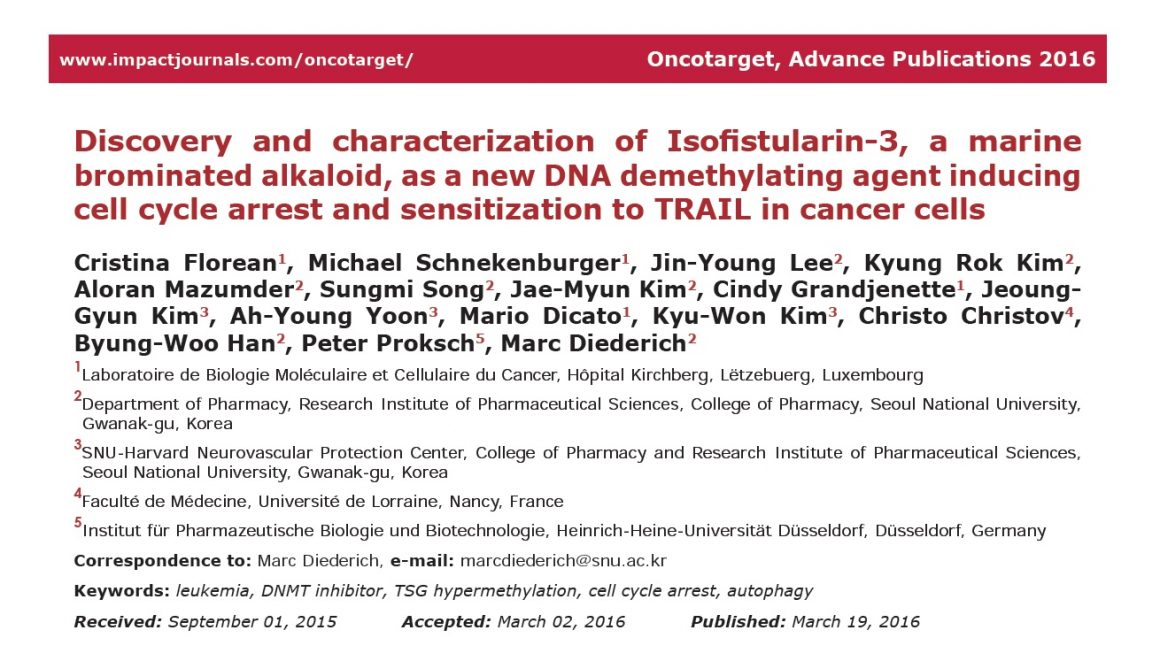- by Prof. Ehrlich

The Prof’s Blog – Isofistularin-3 identified as new DNMT inhibitor to fight cancer
Within the series „The Prof’s Blog”, Prof. Hermann Ehrlich, mentor of BromMarin, frequently reports about recent research results and application fields of marine sponges. In the present article, he devotes to Isofistularin-3 as a potential anticancer agent.
Although marine sponges represent rather simple organisms, their survival strategy is still not decoded – yet they exist since millions of years. However, what researchers have recognized are the manifold effects of the chemical defense of marine sponges. By now, 3 agents of marine sponge origin became drug approved, 2 of them as anticancer drugs. Cytosar-U ® (1969) against leukemia and Halaven ® (2010) against breast cancer (for a review of marine organism’s clinical pipeline see here).
Likewise, bromotyrosine derivatives as from the sea sponge Aplysina aerophoba are described with regards to their antitumoral effect. The antileukemic effect of Aeroplysinin-1 (C9H9Br2NO3) is even proved in vivo. By contrast, investigations on Isofistularin-3 (C31H30Br6N4O11) are still rare – surely, the generally restricted availability of the marine agent might be crucial here. The insights by Florean et al. (2016) have to be classified as even more significant in this light. Within their study, they characterized Isofistularin-3 as potential candidate for further anticancer drug development. And with BromMarin, who are able to provide the agent in gram-scale already today, the following results obtain even greater relevance.
The authors, including the marine pharmacist Prof. Peter Proksch of the Heinrich Heine Universität Düsseldorf, describe the brominated alkaloid Isofistularin-3 as a new DNA methyltransferase (DNMT1) inhibitor. DNMT inhibitors disable enzymes that bind methyl groups to the DNA. Thereby, they facilitate to silence cancer-promoting genes and activate repair mechanisms. Malignant cells are not destroyed this way. However, they are reprogramed in a benign way so that cancer-suppressing genes are activated further. In the laboratory, the researchers managed to proof that Isofistualrin-3 is binding within the DNA binding site of DNMT1.
Thus, scientific evidence has demonstrated that the viability and colony of tumor cells as well as the in vivo tumor forming is reduced by Isofistularin-3. Thereby, the healthy blood cells (PBMCs) remain unaffected, which is of great importance. The authors also did not reveal toxic effects. This increases the likelihood that Isofistularin-3 might be introduced as a methyltransferase inhibitor with reduced side effects.
Once again, it appears that the potential of known agents from marine sponges is not yet exhausted. Research, which e.g. lead to novel cancer-fighting drugs, should particularly be considered as useful, if the long-term and sustainable supply with the agents is secured. BromMarin is conducting pioneering work here. By means of sponge farming, BromMarin are able to provide the agent in gram-scale already today – which is relevant for the clinical trials. Now, if you are interested in a cooperation, please do not hesitate to contact the team BromMarin.
Regards,
Prof. Hermann Ehrlich
Thank You! The form has been sent.
Error! The form could not be sent. Please try again later.
